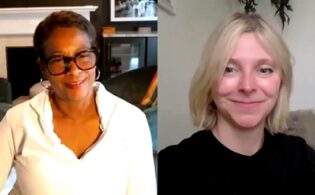Dawn Porter, the founder of Trilogy Films, discussed her body of work and navigating the evolving documentary landscape in her TV Real Festival keynote today.
Porter, whose credits include Deadlocked: How America Shaped the Supreme Court, spoke with TV Real’s Kristin Brzoznowski for her session, which you can view here.
“In selecting projects, it’s really important not only that you’re captivated by the core themes, but also that you feel like you have something to add, something to say,” Porter said on how she chooses her projects. “When I’m thinking about what films to tackle, I’m thinking about where I am in my life, what’s happening in the world and how this will be received. What is it going to add to our conversation and understanding? I’m looking for something with social relevance that answers a question that I’m puzzling about or teaches me something I didn’t know.”
Porter went on to talk about her slate of recent projects, including The Disruptors, a film about progressive African-American female prosecutors in the U.S., directed by Yoruba Richen; the archive-heavy Deadlocked: How America Shaped the Supreme Court, for Showtime and Paramount+; and a new project about Nelson and Winnie Mandela based on Jonny Steinberg’s book Winnie & Nelson: Portrait of a Marriage.
The keynote conversation then addressed the challenges of financing projects today. “I’ve had a number of projects come to me from networks, so usually they have the financing. Those are great; it may take several months of development, but once you’re set, the network will pay the full freight. Then there’s some private investment. [The Mandela doc] is funded right now solely by the Schultz Family Foundation. They are interested in stories about leadership and what politics are actually comprised of. But we’ll need more private money and then hopefully a presale for that. It’s usually a combination of some private money and then a network or a streaming service. There are also foundations, which are incredibly important to our work. The foundations are besieged with worthy projects. I don’t envy them for the job of figuring out what to fund. I’ve been funded by the Ford Foundation, the Mellon Foundation and the MacArthur Foundation. I’m really fortunate that those actors are in our marketplace.”
Porter continued, “There’s a disconnect between what the private funders are interested in and what the buyer/distributor entities are interested in. I’m seeing smaller budgets, longer time to ‘yes’ and less money for socially conscious, social justice projects and more of a need for celebrity. True crime has always been its own popular genre. It’s harder to make films that are about art or politics that are not sensational. It’s always been hard. We’ve got to be more creative. We’ve got to be really good partners. We’ve got to really watch those budgets. A lot of folks are reaching out to brands, which is an interesting development. Not every film is right for brand support, but there are some. As filmmakers and producers, we have to do what we’ve always done, which is roll up your sleeves, get creative, be clear about the story you’re telling and the quality that you’re making. We also need to diversify. We’re looking at doing museum projects or projects that are more commercial, so we’re not just dependent on the commission of the broadcaster or streamer.”
 TVREAL
TVREAL






